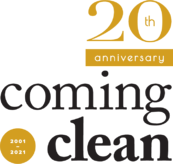April Spotlight: Farmworker Association of Florida
|
|
Farmworker Association of FloridaMembers: Jeannie Economos
|
|
|
About the Farmworker Association of FloridaThe Farmworker Association of Florida (FWAF) is a statewide, grassroots, community-based, non-profit, farmworker membership organization with over 10,000 Haitian, Hispanic, and African American members and five offices in the state of Florida with a 37 year history of working for social and environmental justice with farmworkers. FWAF’s long-standing mission is to build power among farmworker and rural low-income communities, to respond to and gain control over the social, political, economic, workplace, health, and environmental justice issues that impact their lives. |
Our work with the Coming Clean NetworkFWAF has been involved with Coming Clean since it was founded in 2001, and became increasingly involved in bringing a grassroots farmworker voice to policy work around 2006. FWAF has had a leading voice in Coming Clean’s Farmworker Health and Justice Team and, in 2020, helped to launch the new Chemicals, Food/Agriculture, and Climate Team. |
"Getting justice for farmworkers means a completely new paradigm. It doesn't mean better wages. It doesn't mean lack of exposure to pesticides. It doesn't mean organic agriculture. It doesn't mean changing just the immigration system. It means changing our entire agricultural system from the ground up."— Jeannie Economos |
Tell us about your organization and what vision they're working towards in the world.
Our organization was founded in 1983, and incorporated in 1986. We have grown statewide with five offices in the state of Florida. We're very grassroots: The majority of our staff members are former farmworkers, and most of our board of directors are either current or former farmworkers.
The two pillars of our work are immigrants rights and justice for immigrants, and pesticide health and safety of farmworkers. We've expanded to other kinds of things, including community-based research projects; and we also do a lot around worker rights, including issues of labor trafficking, sexual harassment, wage theft, better wages for farmworkers, housing, disaster response, and a lot more.
Our organization is fighting for social justice for farmworkers, and our vision is a reformed agricultural system that includes racial justice, social justice, environmental justice, and health justice for farmworkers in Florida and around the country. We believe our agricultural system is deeply flawed and is based on historic racism. Part of our solution to address the systemic problems in our agricultural system is our agroecology and community gardens project in which we promote sustainable solutions, food sovereignty, exchanging ethnic and cultural ways of growing food, and building solidarity.
What has being a part of Coming Clean meant for your organization? Are there any favorite stories you want to share?
Coming Clean gave us a platform in which to connect with other farmworker organizations and other advocacy organizations to work in collaboration and make changes on the national level to farmworker policy on health and safety.
My favorite story is not one particular incident; it's the whole process of working to get the Worker Protection Standards improved, which was really a 20-year-long process. But it's really beautiful because so often grassroots groups have been skeptical of big national groups that tend to get all the funding and tend to like to take all the credit a lot of the time; but we had an incredible relationship in the Farmworker Health and Justice Team where the big groups like Farmworker Justice, Earthjustice, Migrant Clinicians Network, Pesticide Action Network worked with complete transparency and really let the grassroots groups and the farmworker voices lead. I have beautiful memories of farmworkers in DC in good weather and bad weather speaking to EPA and the Office of Management and Budget; and Coming Clean enabled us to do that.
What are the biggest opportunities we have right now to win the kinds of changes that you want to see? What does your organization bring uniquely to the table to help us in this moment?
We're in a really important moment. There's a new consciousness because of the racial justice awareness now, and we have the potential for some very good and important national policies on the table. This includes the heat stress prevention bill that we're supporting and advocating for the Protect America's Children from Toxic Pesticides Act. The Environmental Justice for All Act is incredible. The Equitable and Just National Climate Platform is an incredible piece of work that we support, and the process now about updating the Louisville Charter for Safer Chemicals to bring everyone's awareness to making all of us more accountable.
We have been saying for decades that farmworkers live the legacy of slavery. And that kind of rolled off people's backs for years. And for the first time now, since the racial justice protests starting a year ago and through the summer and fall, people are starting to get it. It's real -- that so many people today are actually living the legacy of slavery, and farmworkers are the biggest example of that because they are doing the work that enslaved people did 150 years ago. So I think this is a very critical key moment, and I think being part of the Farmworker Health and Justice Team and being part of Coming Clean positions us all at a critical moment to be able to make this moment matter. ¡SÍ SE PUEDE!
If justice is realized for farmworkers what would that look like? What would be different?
If we're going to get justice for farmworkers, we'd have a completely new paradigm that is even more than just the Just Transition. We need to completely rethink the way we do our communities and our country. We believe in food sovereignty, where people should have control over their own food system, and that means not having control by Big Ag, but having control in communities at the grassroots, for the people, by the people. That is a huge leap, but we have to start somewhere. Part of that is wresting control away from Big Ag, which is in collusion with politicians and the government, and as long as that continues we're not going to have justice for farmworkers or really for anybody else.
In the meantime, we work for the reduction of pesticides, for regenerative agriculture that is grassroots based -- not top-down, but bottom-up. The biggest thing of all is we need to quit talking and start listening. We need to listen to the African-American farmworkers, the people from Honduras, people from Guatemala, El Salvador, Mexico, Haiti. Listen to them. They have a lot to tell us. If we're telling them what to do and we're not listening to them, then we're not going to have justice. So we need to shut up and listen to the voices that have a lot to tell us, because they're the ones that should be creating justice for their communities.
Is there anything that you feel that Coming Clean members should be holding in top of mind as we set our goals and visions and priorities for the years ahead?
It’s the issue of how to connect farmworker issues with other environmental justice issues. Most environmental justice communities are really place-based, where there’s a real connection between the community and the sources of contamination. A lot of farmworkers are mobile, and farmworkers as a community are nationwide, so it's not like a community next to an oil refinery. One of the things that we have talked about doing for years, and I think we're going there now, is to make that connection from the sources -- mining and manufacturing and production -- to the use and disposal of pesticides, and how that exposed all of those communities all along the chain: Environmental justice communities that we need to find how to connect.
"It's really important for people to remember that farmworkers feed us all, and that's not just a slogan. We can do all these other things that we do without thinking about it, because there are people out there -- people: men, women, and even children -- that are doing the hard work that the rest of us don't do. So we are all accountable to farmworkers, and that's why we all need to work for justice."— Jeannie Economos |




